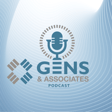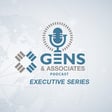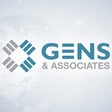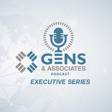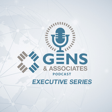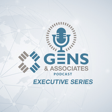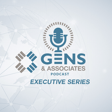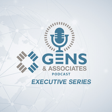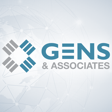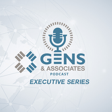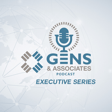Become a Creator today!Start creating today - Share your story with the world!
Start for free
00:00:00
00:00:01

Episode #20 - Organizational Strategies make a difference on Performance Improvement
Welcome to The Gens & Associates Podcast, where key members of the consulting firm will discuss insights into their research, regulatory trends and hot topics, as well as converse with industry thought leaders.
In this episode, Katherine Yang-Iott and Steve Gens highlight key learnings about how organizational strategies strengthen culture, team dynamics, and workforce capabilities from the 2024 WCRIM Survey.
Transcript
Introduction and Series Wrap-up
00:00:00
Speaker
Hi everyone, and welcome to the Gens and Associates podcast. I'm your host, Katherine Young-Aia, consultant and analyst with Gens and Associates. This episode wraps up our 2024 world-class REMS series where members of my core research team have been speaking with me about all the different sections of our latest large-scale industry benchmark.
Industry Benchmark Overview
00:00:21
Speaker
For the episodes in this series, we've talked about a lot of things. We've shared our key learnings about advanced technology, um about data governance, how to sustain high-quality data.
00:00:32
Speaker
Steve, welcome back. um You and I actually, we in a previous episode, and we highlighted the trending data that we've been tracking in the world class room section. And in this episode, we are going to close out the series with what we found in the organization strategies section of the study.
Significance of Organizational Strategies
00:00:50
Speaker
And spoiler alert to our listeners, I may be slightly biased, but I find the takeaways from this section of the research to be the most interesting and oftentimes the most revealing too. So Steve Gens, everybody, he's here with us today. um Is our managing partner, probably needs no introduction, but we always have new folks listening in. So Steve, why don't you give a quick intro and say hello.
00:01:11
Speaker
Yeah, thanks a lot, Catherine, and hello, everybody. Steve Gens here, the founder of Gens & Associates, and we're starting our 20th year this month, so it's been quite the journey on this. Tons of surveys we've done in supporting different different types of clients, no matter if it's industry, you know service, or software providers, and always love our mission statement, everybody gets better. so And I agree with you, I think, you know, the organizational aspects and how we were able to piece that together to really show different strategies that improve performance, you know, was really, really interesting and exciting this time around. Yeah.
00:01:53
Speaker
Well, thank you. So let's get started.
Impact of Culture on Performance Improvement
00:01:55
Speaker
Um, let me just tell our audience a little bit about the section. So in the organizational strategies and the row rim program status section of the survey, we design our questions to look at various aspects of regulatory organizations, such as their strategic initiatives and end to end process priorities. But for this episode, we're going to focus on organizational strategies that make a difference in performance improvement. Steve, I have three things that I really want to pick your brain on. And the first one is about culture. I'm not sure if you remember this famous phrase, but i I'm pretty sure it's well known, at least here in the States. But the same goes, culture eats strategy for breakfast. And what this means is that no matter how brilliant or well-planned your business strategy is, it's not going to get accomplished if the organization's culture doesn't encourage or support the people to do it, right? At least it won't be done as easily.
00:02:50
Speaker
In a nutshell, culture is powerful, it's empowering, and teams should not underestimate its ability to make or break plans. When we spoke with organizations that had reached the world class rating um a few years ago, they all mentioned that culture um was a part of their recipe for success. And I'm saying all this because I want our listeners to understand why we started to include cultural questions in our benchmarks. So my question for you is, what evidence do we see in the data that supports our knowledge and our experience, that organizational strategies, culture, practices, all of those things that make a huge difference in the performance improvement?
Challenges in Benchmarking Culture
00:03:29
Speaker
Yeah, and that's ah that that's quite the other question. and and you know Obviously, we took that on, probably starting in 2022. Your point about when our first survey participants reached or broke the world-class level, that was 2020, just as as you were starting, Catherine. and I just remember those interviews. because you know there's like how do you benchmark culture that's such an abstract thing but those those interviews with our world-class companies you know we're really really informed that and I know we gave a shot at it in 2020 then then switched the infamous you know question nine um as far as you know different organizational strategies you know practices and norms but it
00:04:15
Speaker
It goes back to the ah the pyramid that you put together, and for our listeners, if you haven't seen it, just think of a triangle. And on the bottom part of it, that the you know the core foundation is organizational strategy, culture, and support. Things like the status and maturity of a data governance program. Is there a cultural quality and accountability? um KPIs and continuous improvement we see as a very important organizational strategy, how an organization gets its momentum, the flexibility everybody talks about, you know, agile more from an organizational, less from a technology standpoint, you know, exact advocacy and the list goes on. And what's been interesting since we started the the first
00:04:58
Speaker
RIM survey back in 2013-14, there's no correlation between our top performers to anyone software system provider. And we've seen that, it's like what what aspects of the organization and then layer on you know process maturity, regardless of whoever your technology provider is, you'll get more value from it and therefore, you know, you know, maximizing business benefits. So what was so interesting, and I'll just just give a couple of, ah I guess, teaser stats and all that, is the some of the questions that go into the individual question score.
Efficiency and Cultural Practices
00:05:35
Speaker
We look at things like ah efficiency, business outcomes, is the um you know the information, that key regulatory information, can you get it real time or not? So our top performers,
00:05:48
Speaker
ah they're substantially higher in the efficiency levels of the 15-room capabilities. We look, ah the bigger one is the business outcomes. So like our top performers, you know, reduce time to health authority, health authority submission, 77% of our top performers have gotten that, only 32% of everybody else, you know, reducing cost, resource reallocation, ah That real-time information, 68% of our top performers are there or close to being there. Everybody else is about half of that. So we're starting to see the evidence. And I think what was so fascinating about that one question and nine is it's not part of the scoring. But when we look at those different cultural norms about you know implementing, you know the ability to implement effectively
00:06:39
Speaker
um how you collaborate across, you know, teams, um you know, within regulatory, how do you collaborate ah with other functions, you know, these are a lot of the kind of cultural norms and practices that are top performers were clearly heads and toes above everybody else. So that just supports ah that the culture is really important and then we quantify business benefits you know along with that. So that's the first time we've been able to do absolutely in the research. It's just clear, clear as day.
00:07:12
Speaker
So those are just, I think some intro. We could go very deep, you know, just on this one topic, but yeah. Yeah. Maybe let me just interrupt really quickly and just kind of clarify a couple of things for our listeners, right? Who may not know what question nine is. Um, so question nine, we asked, we have a list of all these different organizational practices and norms, right? Like the ones you listed out and we asked our respondents to tell us, you know, if this was an area of strength within their regulatory organization or if these were areas that they're actively improving on. Um, are, you know, not actively improving on are there, you know, they don't have any concerns about. And like you said, you know, this isn't used to, um, you know, it's not using the scoring. However, when we looked at the cohort of top performers, right, which scored very highly for it, highly for those performance.
Accountability in Regulatory Data Management
00:07:59
Speaker
indicators that that do get measured, we see that this top performing cohort have so many more areas of strength in terms of these organizational practices, which lets us know that these you know that having these practices and doing these things clearly have an impact, a positive impact um on your ability to improve your performance. um One of the things that's actually really interesting to me, right? One of the challenging areas that stood out to me in this question is that even when we break out the data, um regardless of their of our yeah the tier size or if they're a top performing cohort or not,
00:08:35
Speaker
is that companies, all companies, right or most companies are working on their end users taking accountability for their data. Out of the 63 companies that that participated, I think only a handful said that this was an area of strength for them. So my question for you is, why do you think that end users taking accountability of their data is such a challenging area for most regulatory organizations? Do you have any opinions on key steps that teams can take to really improve here? Yeah, I certainly have an opinions Catherine on it. But what was me when we we saw that come out and again, like you said, no matter how we twisted the data looking like who's doing this well, even our top performers, I think it was at least 75% on average, and users taking accountability for their data is is just a big issue generally for regulatory and
00:09:27
Speaker
I know over the last couple of months we've thought a lot about this, like you know why is this so? And kind of looked into the research a little bit more. Well, there was only, I think after 63 companies, only five you know that said um that it's an area of strength. So that that's quite a statement where almost everybody else is trying to work on it or um or it's just a ah you know a big issue for them. So I took a look at the five companies and again there wasn't anything clear.
Data Governance and Accountability Measures
00:09:58
Speaker
Now it was interesting four out of the five are in our strong performers and the one that wasn't um as we measure the and the maturity of the data governance you know you know the formality and the practices they actually rated really really high in that area.
00:10:16
Speaker
So, and that's the second thing I looked at, you know, with these companies, where did they rate on the the data governance and three out of five are rated extremely high, meaning six, you know, substantially over the industry average. you You know, a fourth one was above the industry average and the fifth company didn't answer that question. The other thing I always looked at is, well, do they tie to reward systems? What are rewarding? Because I recall one or two companies, ah Catherine, that they had very yeah immature data governance. They were just starting to put in those practices. But the one practice they had, and they had very high data quality scores,
00:10:57
Speaker
was tying data quality into reward systems, into those you know job descriptions, you know objectives for regulatory, have the visibility of measuring it and how we're doing. So so I think you know that kind of answers the question, what are what are three practices? you know having ah a formal data governance program, which you know the job is to have very high data quality, which gets into you know being accountable and responsible. you know End users you know or the people that own the data are are accountable. The data governance can be responsible for the stewardship of it. Is it tied organizationally into reward systems? And is it being measured? And if it is being measured, is it widely transparent? you know Because we've talked about that quite a bit. Anything you measure,
00:11:43
Speaker
And if you broadcast it, it really gives a sense to the organization, you know, where are the organization's at, what is it doing well, which is recognition, right? And where are the areas where there's struggle, which there can be more focus for whatever the root cause, why it's a struggle. So I think those are kind of the three practices, but again, it was almost shocking that that the high percentage and irregardless, you know, even with our top performers, this is a struggle. Yeah, I absolutely agree. I mean, I think the ones that are the biggest challenges are usually the the more sort of complex, I don't want to say a complex processes, but there's a lot involved, right? And I'm happy to hear you mention the importance of data data governance. You know, that's an organizational strategy that um that we talk quite a bit about. We have questions looking directly at the maturity of governance.
00:12:35
Speaker
um frameworks within companies and how that correlates you know with performance overall and a lot of the steps that we, a lot of the practices and the norms that we measure in question nine about the organization actually are steps for um putting together like a formal data governance structure as well. so for the listeners who have not been able to see a report or you know perhaps if you have, then if you look at those sections and those questions, it'll give you a lot more sort of ah storyline to what we're talking about here today. um my My last question for you is actually about new skills and capabilities because talent management is a significant part of organizational strategies, right just like data governance.
Upskilling in Data Governance
00:13:20
Speaker
Our study quantified where organizations want to upskill their employees in areas such as data governance,
00:13:27
Speaker
um data stewardship and structure data submission capabilities. We actually looked at a lot of other emerging skills and capabilities, but these three here were identified as the highest percentage to be upskilled. So we know that companies are planning on upskilling their employees in these areas, but what's unclear um I think is how this is going to get accomplished. So in terms of strategies or considerations, I mean, like you said, you always have opinions. So, you know, what's your insight on this? Yeah, and I think the first thing is you know each one of those three categories you mentioned, the data governance, data stewardship, and structured data submissions, know they're different. you know So for our listeners, we are interested in no different new types of skills and capabilities and regulatory. And this is the second time we really focused.
00:14:18
Speaker
Kind of what is it originally it was more about kind of jobs and roles and those names. They're so variable between Organizations are really kind of focusing on capabilities and skills. I think we just got much richer, you know information So classically you could say well, you know the big three of training rotations and internships, you know, you know people automatically go to training. How can I be a you know, a good, you know, data, you know, what's the right data governance program. Now, certainly we have opinions on that and we have a whole section in our executive lounge, you know, downed out the operating model down to job descriptions. Data stewardship has been talked about, you know, probably for five or six years and is growing in importance as we saw, you know, in the data too.
00:15:03
Speaker
There's a lot more focus on getting people better or upskilling. So so there's classic training there's rotations and this is where it gets interesting in life sciences because There's other areas in life sciences that are so much more data intensive So things like data governance and stewardship if you go over to the folks in manufacturing even in clinical and there's a lot more maturity. So, you know, one school thought is could we have a rotation program, you know, where people could learn regulatory but bring in those fundamental how do we do data governance right and be at the data stewardship roles. The other thing as far as internships and the reason I'm bringing this up, I was at one of our clients last Thursday afternoon and they had their interns in and I had thought, well, you know, there may be some
00:15:55
Speaker
some kids right out of a college or in college, and this is kind of their summer intern, but these are professionals with three or four different years of different types of experience, but they're trying regulatory out for the at the first time, and they actually called it ah you know internships. So that's kind of a classic. Now, if people really wanna think out of the box, you know hey, could we rotate in different divisions within life sciences, but there's also a school of thought, is there's other industry and I'm talking manufacturing outside of life sciences and even the finance sector that that are very, very data driven and concepts of data governance and stewardship thinking about SAP and things in in finance, the finance sector.
Transferring Skills from Other Sectors
00:16:43
Speaker
that they've been talking data stewardship and governance for 20 years. So there's also school thought that we bring in experts in those capabilities and we'll teach them regulatory. And and just in the last four or five months, you know there's with some of the RegOps leadership and executives, you know there's kind of a really good question that they're exploring. Is it easier to teach somebody that's really good with data, you know the data stewardship, regulatory, or a regulatory person about data stewardship and governance? So that that covers those two. Now, the other one, with the structured data submissions, this is new for everybody. um And still, probably, I would dare say,
00:17:25
Speaker
in the conceptual you know kind of figuring it out phase. So when I was prepping you know for this, I thought back, and jeez, it has to be at least 20, maybe a little bit more when the ECTD just came out. So that was a whole new structure for everybody in life sciences. So nobody was an expert. um And you can make the argument with IDMP too. Nobody was an expert on this you know impending you know data standard. but you just had to figure it out. So there, I think with the structured data submissions kind of just some thoughts or ideas. I don't even think I would call these recommendations, Catherine, that.
00:18:05
Speaker
You know, if you have colleagues that are skilled, say, in structure content authoring, IDMP, they've been through the IDMP programs over the last couple of years, they might be most or best equipped to figure out the structure data submissions. So it's kind of like binding those kind of publishers, dossier managers with the the people that really understand the structure content authoring IDMP. you know, maybe that type of combination is where you get the skills to figure it out. So it's probably more about a team focus than an individual focus on those.
00:18:42
Speaker
so Thanks, Steve. that's That's actually pretty insightful. you know When I think about upskilling, I think about it from a slightly different point of view. right If you were to have um your job, but then there's a new process or new technology, you know how do you sort of move from how you've always done something to a new way of doing something? um I think it's really important to have that end-to-end clear vision of how things work within regulatory. I think that would make you a better regulatory professional. so I think um for this section of the study, it'll be interesting to see how this evolves um you know and in the next couple of cycles to see how people are doing this well.
Resources and Further Episodes
00:19:20
Speaker
So I think this is actually a really nice way to conclude our episode and actually the series. So listeners, if you have questions or comments about anything that you heard Steve and I discussing here, please just reach out to us and we will connect with you. As I mentioned in our intro, we have several other podcast episodes available if you want to hear more about what we learned throughout the setting in the different sections. If you want to see the question by question results for for all those sections, we do have a report. It's available to our members. um through our Guns and Associates website, um or if your company participated, you should have received a copy of the report as well. The webinar recording is up. If you are not a person who likes to digest reports, you can listen to how our team interpreted it, although question by question results via video. So, Steve, before we go, anything else that I forgot here?
00:20:16
Speaker
No, I mean, it was a really comprehensive study. And like I had mentioned in the other podcasts, this one was a pleasure. Just, you know, Greg and I started the first ever RIM study back in 2013. And in some ways, the majority of industry graduated because there was such a leap of jump in performance, not for all companies, but for a good segment of industry, irregardless if you're a large, mid tier or smaller. companies So it was just great to ah see that. And I actually, as we talk with those clients, congratulate them too. So I think I'll i'll just close on that note. Yes. I think um as a team, we were saying, remember a couple of years ago, we're asking if if industry has tipped and we were like, yay, it tipped. So um just to quickly sort of wrap up, um we do have a white paper that's going to be coming out to summarize the report findings. I think that will be out in the fall.
00:21:10
Speaker
um Steve, thanks so much for being here with me. To the listeners, thank you all for tuning in. Enjoy the rest of your day. Until next time, cheers.
